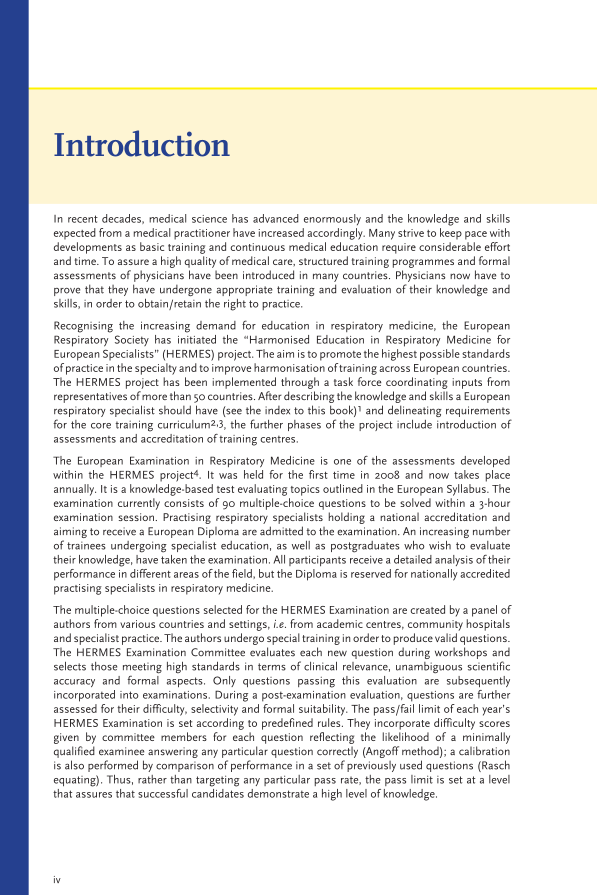Introduction iv In recent decades, medical science has advanced enormously and the knowledge and skills expected from a medical practitioner have increased accordingly. Many strive to keep pace with developments as basic training and continuous medical education require considerable effort and time. To assure a high quality of medical care, structured training programmes and formal assessments of physicians have been introduced in many countries. Physicians now have to prove that they have undergone appropriate training and evaluation of their knowledge and skills, in order to obtain/retain the right to practice. Recognising the increasing demand for education in respiratory medicine, the European Respiratory Society has initiated the “Harmonised Education in Respiratory Medicine for European Specialists” (HERMES) project. The aim is to promote the highest possible standards of practice in the specialty and to improve harmonisation of training across European countries. The HERMES project has been implemented through a task force coordinating inputs from representatives of more than 50 countries. After describing the knowledge and skills a European respiratory specialist should have (see the index to this book)1 and delineating requirements for the core training curriculum2,3, the further phases of the project include introduction of assessments and accreditation of training centres. The European Examination in Respiratory Medicine is one of the assessments developed within the HERMES project4. It was held for the first time in 2008 and now takes place annually. It is a knowledge-based test evaluating topics outlined in the European Syllabus. The examination currently consists of 90 multiple-choice questions to be solved within a 3-hour examination session. Practising respiratory specialists holding a national accreditation and aiming to receive a European Diploma are admitted to the examination. An increasing number of trainees undergoing specialist education, as well as postgraduates who wish to evaluate their knowledge, have taken the examination. All participants receive a detailed analysis of their performance in different areas of the field, but the Diploma is reserved for nationally accredited practising specialists in respiratory medicine. The multiple-choice questions selected for the HERMES Examination are created by a panel of authors from various countries and settings, i.e. from academic centres, community hospitals and specialist practice. The authors undergo special training in order to produce valid questions. The HERMES Examination Committee evaluates each new question during workshops and selects those meeting high standards in terms of clinical relevance, unambiguous scientific accuracy and formal aspects. Only questions passing this evaluation are subsequently incorporated into examinations. During a post-examination evaluation, questions are further assessed for their difficulty, selectivity and formal suitability. The pass/fail limit of each year’s HERMES Examination is set according to predefined rules. They incorporate difficulty scores given by committee members for each question reflecting the likelihood of a minimally qualified examinee answering any particular question correctly (Angoff method) a calibration is also performed by comparison of performance in a set of previously used questions (Rasch equating). Thus, rather than targeting any particular pass rate, the pass limit is set at a level that assures that successful candidates demonstrate a high level of knowledge.
